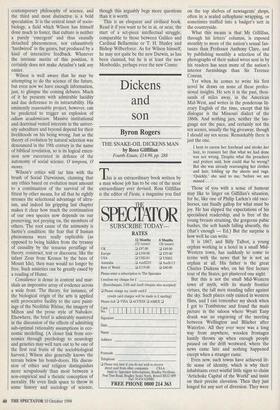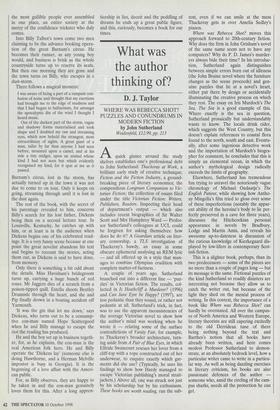Dickens and son
Byron Rogers
THE SNAKE-OIL DICKENS MAN by Ross Gilfillan Fourth Estate, £14.99, pp. 288 his is an extraordinary book written by a man whose job has to be one of the most extraordinary ever devised. Ross Gilfillan is the editor of Fiesta, a magazine you find on the top shelves of newsagents' shops, often in a sealed cellophane wrapping, or sometimes stuffed into a badger's sett in the countryside.
What this means is that Mr Gilfillan, through his letters' columns, is exposed monthly to more of the nation's sexual fan- tasies than Professor Anthony Clare, and by publishing monthly a selection of the photographs of their naked wives sent in by his readers has seen more of the nation's interior furnishings than Sir Terence Conran.
Yet when he comes to write his first novel he draws on none of these profes- sional insights. He sets it in the past, thou- sands of miles away, in the American Mid-West, and writes in the ponderous lit- erary English of the time, except that his dialogue is the Missouri dialect of the 1860s. And nothing jars, neither the lan- guage nor the pace, and certainly not the sex scenes, usually the big giveaway, though I should say sex scene. Remarkably there is just the one.
I bent to caress her forehead and stroke her hair, to reassure her that what we had done was not wrong. Despite what the preachers and praters said, how could that be wrong? But she was already rearranging her clothes and hair, folding up the sheets and rugs. 'Quickly,' she said to me, 'before we are missed ... '
Those of you with a sense of humour may like to linger on Gilfillan's situation, for he, like one of Philip Larkin's old race- horses, can finally gallop for what must be joy. He has slipped the expectations of his specialised readership, and is free of the young breasts straining, the gorgeous pubic bushes, the soft hands falling absently, the (that's enough — Ed.) But the surprise is how well he can write.
It is 1867, and Billy Talbot, a young orphan working in a hotel in a small Mid- Western town, has suddenly to come to terms with the news that he is not an orphan at all. His father is the great Charles Dickens who, on his first lecture tour of the States, got plastered one night.
But this is not the small Mid-Western town of myth, with its sturdy frontier virtues, the tall men standing taller against the sky. Such places only existed in western films, and I can remember my shock when I got to Tombstone and found the main picture in the saloon where Wyatt Earp drank was an engraving of the meeting between Wellington and BlOcher after Waterloo. All they ever were was a long way from anywhere, wooden frontages hastily thrown up when enough people paused on the drift westward, where the news came late and nothing happened except when a stranger came.
Even now, such towns have achieved lit- tle sense of identity, which is why their inhabitants erect wistful little signs to claim 'Artichoke Capital of the World' and insist on their precise elevation. Then they just longed for any sort of diversion. They were the most gullible people ever assembled in one place, an entire society at the mercy of the confidence trickster who duly comes.
Into Billy Talbot's town come two men claiming to be the advance booking opera- tion of the great Barnum's circus. He becomes their runner, as any young boy would, and business is brisk as the whole countryside turns up to reserve its seats. But then one morning they are gone and the town turns on Billy, who escapes in a dust-storm.
There follows a magical moment: I was aware of being a part of a rampant con- fusion of noise and thought that my exertions had brought me to the edge of madness and that I had begun to hallucinate, for amongst the apocalyptic din of the wind I thought I heard music.
Out of the darkest part of the storm, vague and shadowy forms materialised and took shape and I doubted my raw and streaming eyes, which now beheld the strangest, most extraordinary of sights. A great giant of a man, taller by far than anyone I had seen before, mounted upon a camel, and at his side a tiny midget, upon an animal whose kind I had not seen but which evidently recognised my kind, for it spat at me as it passed.
Bamum's circus, lost in the storm, has actually turned up in the town it was not due to come to on tour. Only it keeps on going, streaming through until it is lost in the dust again.
The rest of the book, with the secret of his parentage revealed to him, concerns Billy's search for his lost father, Dickens being then on a second lecture tour. In Louisville, Kentucky, he catches up with him, or at least is in the audience when Dickens begins one of his celebrated read- ings. It is a very funny scene because at one point the great novelist abandons his text and begins to recount the stories, acting them out, as Dickens is said to have done, from memory.
Only there is something a bit odd about the details. Miss Havisham's bridegroom turns up, carrying a huge bunch of red roses. Mr Jaggers dies of a scratch from a poison-tipped quill. Estella shoots Bentley Drummle through the heart, and she and Pip finally drown in a boating accident off Yarmouth.
'It was the gin that let me down,' says Dickens, who turns out to be a consump- tive con-man named Hope Scattergood when he and Billy manage to escape the riot the reading has produced.
He and the boy set up in business togeth- er, for, as he explains, the con-man is the real American folk hero. He and Billy operate the 'Dickens lay' (someone else is doing Hawthorne, and a Herman Melville impostor is busy in Georgia). It is the beginning of a love affair with the Ameri- can public.
For, as Billy observes, they are happy to be taken in and the con-man genuinely loves them for this. After a long appren- ticeship in lies, deceit and the peddling of dreams he ends up a great public figure, and this, curiously, becomes a book for our times.











































































 Previous page
Previous page